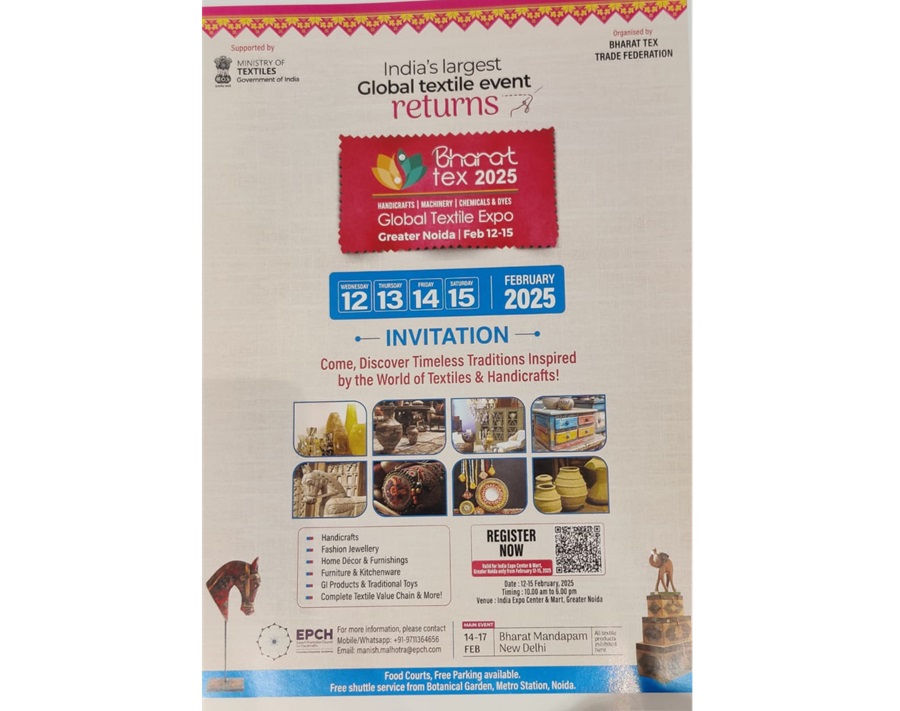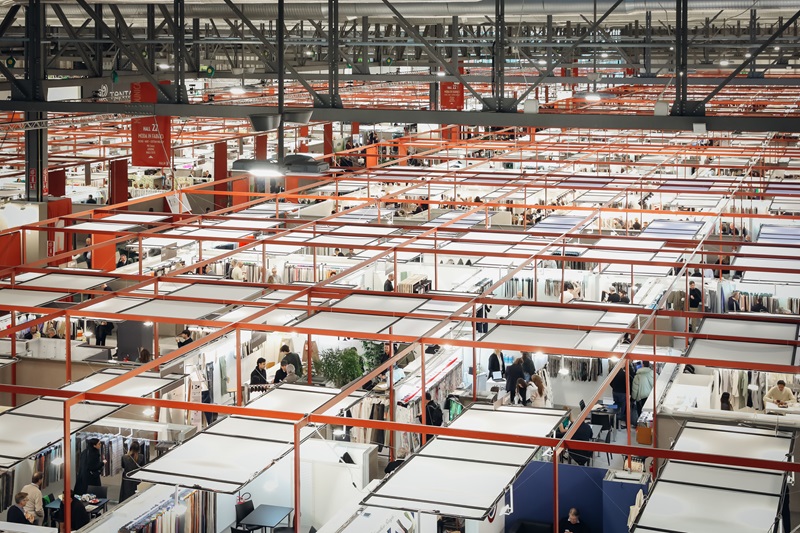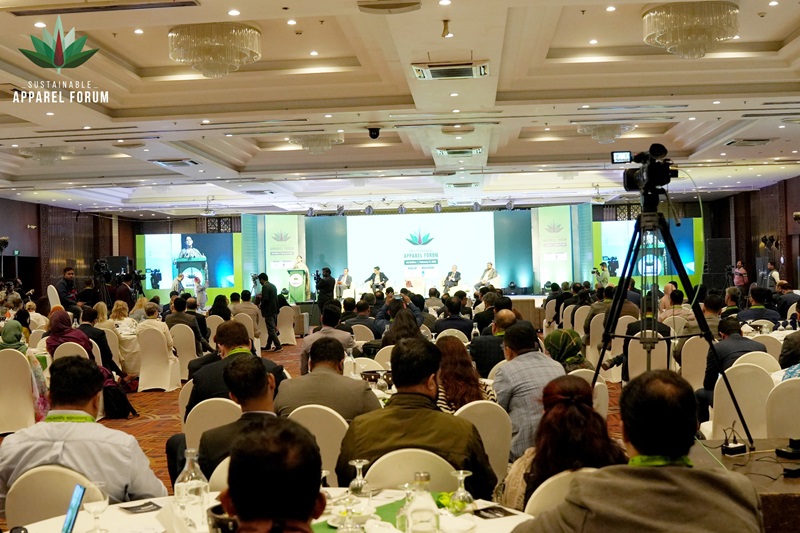FW
Source Fashion, Europe’s leading responsible sourcing show, has revealed key catwalk trends for its upcoming event from 18th to 20th February 2025 at Olympia London. The Source Catwalk will showcase a fusion of innovation, sustainability, and immersive fashion experiences, highlighting the future of responsible design alongside a bespoke collection by headline designer Stuart Trevor.
For AW25-26, three macro trends - Multisensory, Transformative, and Rejuvenating, will shape womenswear collections. Under these, several micro trends emerge. ‘CircusPlay’ takes inspiration from the whimsical world of the circus, featuring bold colors, exaggerated silhouettes, and rich textures. Key pieces include the Bubble Hem Dress, Volume Draped Top, and Exaggerated Shoulder Top, embracing theatrical fashion with modern wearability.
‘Hyper Tactile’ makes fashion an immersive sensory experience with an organic color palette, including hues like Organic Matter and Enchanted Forest, evoking warmth and nature’s enchanting textures. ‘Reconstructed’ celebrates sustainability through upcycling, using patchwork, mixed textiles, and artistic repurposing. The color scheme blends earthy neutrals with Desert Architect tones, balancing warm golds and cool stony greys.
‘Plant Power’ focuses on botanical beauty and plant-based materials, featuring innovative textiles like Pinatex (pineapple leaf fabric) and organic cotton. With dominant green and brown tones, this trend redefines sustainable luxury.
Stuart Trevor, known for his craftsmanship and innovation, will present a bespoke collection from his eponymous label, adding a unique touch to the Source Catwalk. The show promises a forward-thinking vision of fashion, merging creativity, sustainability, and next-generation materials.
Eastman Naia returns to Premiere Vision Paris to highlight the transformative potential of Naia Renew staple fibers. Known for their luxurious comfort and eco-conscious design, these fibers redefine sustainable fashion with versatility and performance.
Naia Renew staple fibers, made from 60 per cent sustainably sourced wood pulp and 40 per cent recycled waste through a low-impact, closed-loop process, blend seamlessly with premium materials like wool, cashmere, and linen. The result: lightweight, breathable fabrics with quick-drying properties, a refined pearl-like luster, and superior comfort.
At Stand 6R30, Eastman Naia presents a curated selection of garments and fabrics developed with leading brands, demonstrating their market-ready appeal. With a focus on circularity, Eastman partners with top European mills like Riopele in Portugal and Pakipek in Turkey to integrate Naia Renew into sustainable textiles. “Through innovation and creativity, we transform Naia Renew into high-performance, eco-friendly fabrics,” says a Riopele spokesperson.
Naia Renew also supports nearshoring, reducing lead times and transportation emissions while ensuring high-quality, responsibly sourced textiles. At Premiere Vision, Eastman Naia celebrates these partnerships, reinforcing its commitment to sustainable textile production.
Ruth Farrell, General Manager of Eastman’s Textiles Business, will further discuss bioengineered and bio-based materials in the panel “How savoir-faire is reinventing the living world”.
Premiere Vision Paris offers Eastman Naia a key platform to connect with designers and brands, shaping the future of sustainable fashion with innovative, high-performance materials.
Record participation and global growth
The 40th edition of Milano Unica, the premier high-end textile and accessories trade show, concluded with record-breaking numbers at Fiera Milano Rho. A total of 723 exhibitors participated, reinforcing the event’s growing international appeal. International visitors surged by 30.5 per cent, representing 98 countries. For the first time, foreign companies accounted for 40 per cent of total attendance, further cementing Milano Unica’s global standing.
Overall, approximately 12,000 buyers attended the event, representing 6,476 companies, a 10 per cent rise compared to January 2024. Among them, 4,800 international buyers from 2,500 companies contributed to this milestone, alongside 4,000 Italian companies (+3.5 per cent).
Strong growth in key markets
Double-digit increases were seen in several key export markets, with France (+35 per cent), the UK (+41 per cent), the USA (+25 per cent), Spain (+55 per cent), Germany (+51 per cent), Japan (+27.5 per cent), Switzerland (+19 per cent), and China (+14 per cent) leading the way. Emerging markets also posted strong gains, including the UAE (+75 per cent), Saudi Arabia (+50 per cent), and Brazil (+55 per cent).
Simone Canclini, President of Milano Unica, expressed optimism about the industry’s resilience despite economic and geopolitical challenges. He highlighted France's impressive performance, with a 40 per cent rise in French exhibitors and 213 visiting French companies the highest among all countries.
Industry challenges and opportunities
During the opening ceremony, Minister of Economy and Finance Giancarlo Giorgetti delivered a video message, while Milan’s Prefect Claudio Sgaraglia emphasized new measures to combat illegal labor practices in the fashion supply chain.
A key discussion panel, Textiles: Production is the True Luxury, moderated by journalist Nicola Porro, featured Toni Belloni (President, Italy LVMH) and Alessandra Gritti (Vice President & CEO, Tamburi Investment Partners). The panel addressed market shifts post-Covid, including rising prices, creative stagnation, and the booming second-hand fashion market. Belloni and Gritti emphasized the vital role of small family-run businesses in driving creativity and innovation, calling for strategic alliances and better access to bank credit.
Regulatory burdens, particularly sustainability-related EU policies, were another concern. Italy’s Vice Premier and Foreign Minister Antonio Tajani, alongside Lombardy Region President Attilio Fontana, pledged to advocate for more business-friendly policies at the European level.
Future outlook and upcoming edition
Milano Unica’s leadership acknowledged the unwavering support of the Italian Trade Agency (ITA) and other partners in expanding its international reach. Massimo Mosiello, General Manager of Milano Unica, announced a special celebration at Teatro Alla Scala in Milan for the upcoming 41st edition, scheduled for July 8-10, 2025.
"Over the past 20 years, Milano Unica has grown into a powerful global event. Beyond the record figures, the true success lies in the appreciation of exhibitors and buyers alike. We are committed to making the next edition even more remarkable," Mosiello concluded.
Kraig Biocraft Laboratories, Inc has successfully engineered a novel silk inspired by the caddisfly, marking a major milestone in advanced fiber development. This breakthrough expands the company’s expertise beyond spider silk and opens new possibilities for high-performance materials.
Caddisflies produce silk with exceptional underwater durability, using it to build protective cases in aquatic environments. By integrating caddisfly silk proteins, Kraig Labs aims to develop fibers with superior adhesion and resilience in wet conditions. Potential applications span medical adhesives, biomedical textiles, performance apparel, and next-generation fiber technologies.
"This achievement showcases our ability to engineer beyond spider silk, unlocking new potential in advanced materials," said CEO Kim Thompson. "By harnessing the diversity of silk-producing organisms, we're creating super fibers tailored for tomorrow’s industries."
The company’s proprietary silkworm-based production system will be used to scale this innovative fiber. The development aligns with Kraig Labs’ vision to blend unique silk protein properties, enhancing strength, elasticity, and functionality. A provisional utility patent application has been filed for the new technology.
"Our team's success with caddisfly-inspired silk highlights our commitment to cutting-edge science and real-world applications," added COO Jon Rice.
Kraig Labs continues to push the boundaries of biotechnology, pioneering sustainable, high-performance materials. This latest advancement strengthens its leadership in silk protein engineering, offering transformative solutions across multiple industries.
Dhaka hosts 6th edition of SAF
The 6th Sustainable Apparel Forum (SAF) concluded successfully in Dhaka, reinforcing Bangladesh’s commitment to responsible sourcing. Organized by Bangladesh Apparel Exchange (BAE) in collaboration with the Embassy of the Kingdom of the Netherlands, the event brought together policymakers, industry leaders, and entrepreneurs to discuss critical sustainability challenges in the apparel sector.
This year’s SAF focused on climate action, environmental conservation, and decent work. The event featured an opening ceremony, four insightful panel discussions, five impactful presentations, and two engaging breakout sessions. More than 40 distinguished speakers and 20 innovators shared their expertise with over 550 national and international delegates.
High profile speakers emphasize sustainability
The forum featured prominent speakers, including Syeda Rizwana Hasan, Adviser at the Ministry of Environment, Forests, Climate Change, and Water Resources; H E Michael Miller, Ambassador and Head of Delegation, European Union Delegation to Bangladesh; H E Andre Carstens, Ambassador of the Kingdom of the Netherlands in Bangladesh; Chowdhury Ashik Mahmud Bin Harun, Executive Chairman (Senior Secretary) of BIDA; and Mostafiz Uddin, Founder & CEO of BAE.
Syeda Rizwana Hasan stressed the need for shared responsibility in sustainability, urging both importers and exporters to collaborate on renewable and sustainable energy initiatives. H E Michael Miller highlighted the EU’s ongoing partnership with Bangladesh, encouraging the country to increase its focus on renewable energy.
H E Andre Carstens reaffirmed the Netherlands’ commitment to supporting Bangladesh’s efforts in sustainability, circularity, and traceability in the apparel sector. Chowdhury Ashik Mahmud Bin Harun expressed Bangladesh’s ambition to lead in sustainable apparel by 2040, calling for collective action. Mostafiz Uddin emphasized the importance of collaboration, investment, and business integration in driving sustainable progress.
Netherlands circular textile trade mission
A key highlight of the forum was the announcement of the Netherlands Circular Textile Trade Mission to Bangladesh, scheduled from February 10-13. Organized by the Embassy of the Kingdom of the Netherlands and the Netherlands Enterprise Agency (RVO), with support from Export Partner, Clean & Unique, BGMEA, and BAE, the mission aims to foster circularity and renewable energy solutions. The participation of 18 leading Dutch companies will provide networking and business collaboration opportunities.
The SAF 2025 reaffirmed Bangladesh’s leadership in sustainable apparel manufacturing. With global partners and industry stakeholders working together, the forum served as a crucial platform for setting sustainability goals and driving impactful initiatives. As Bangladesh aims to become a global leader in sustainable apparel by 2040, events like SAF play a vital role in shaping a greener and more responsible future for the industry.
eVent Fabrics is rebranding its plant-based, ePTFE-free ‘Bio Waterproof” and ‘Bio Windproof” laminates as ‘stormST’ and ‘windstormST for the SS 2026 season. This move aligns with its brand evolution and new tagline, ‘defy the elements.’
The renaming reflects eVent’s commitment to sustainable, high-performance laminates for outdoor, activewear, fashion, hunt, fish, golf, cycling, and footwear markets. The company introduced Bio in 2016 but now sees the term as diluted in the marketplace.
“With sustainability at the forefront, we wanted names that better emphasize our products weather protection while reducing confusion,” said Chad Kelly, President of eVent Fabrics. The updated names align with the brand’s architecture and highlight performance attributes.
Starting February 2025, eVent will phase out Bio branding, including for footwear, ensuring a smooth transition for brand partners. Existing Bio products will remain in the market through mid-2026 to accommodate sales cycles.
eVent will debut stormST and windstormST at Performance Days in Munich this March, reinforcing its leadership in sustainable performance materials.
Kering reported a 12 per cent drop in 2024 revenue, totaling €17.2 billion, as challenging market conditions hit luxury demand. Recurring operating income fell 46 per cent to €2.6 billion, while net income attributable to the Group was €1.1 billion.
Gucci, Kering’s flagship brand, saw revenue tumble 23 per cent to €7.7 billion, with direct retail sales down 21 per cent and wholesale plunging 28 per cent. However, the performance of its leather goods, particularly the Jackie handbag, showed signs of resilience.
Yves Saint Laurent’s revenue declined 9 per cent to €2.9 billion, impacted by a 7 per cent drop in direct retail sales and a 25 per cent dip in wholesale. Meanwhile, Bottega Veneta bucked the trend, growing 4 per cent to €1.7 billion, with direct sales up 10 per cent.
Revenue from Kering’s Other Houses, including Balenciaga, Alexander McQueen, and Boucheron, fell 8 per cent to €3.2 billion. Balenciaga’s leather goods performed well, while Alexander McQueen struggled amid its transition.
Kering Eyewear and Corporate revenue rose 24 per cent to €1.9 billion, driven by Kering Beaute and a strong performance in eyewear, which marked its 10th anniversary.
In Q4 2024, revenue mirrored the annual trend, dropping 12 per cent, with direct retail sales down 13 per cent and wholesale revenue down 10 per cent. Japan was the only region where trends did not improve.
Free cash flow from operations reached €1.4 billion, but excluding real estate transactions, it was €3.6 billion, up 7 per cent from 2023. Net debt stood at €10.5 billion.
Kering proposed a €6 per share dividend, with a final payout of €4 scheduled for May 7, 2025.
Looking ahead, Kering aims to enhance brand desirability, optimize distribution, and drive efficiency while maintaining financial discipline. The Group remains cautious amid economic and geopolitical uncertainties but is focused on a return to growth.
The India Sourcing Conclave (ISC) 2025, organized by the Buying Agents Association (BAA), will be held from February 12-15 at India Exposition Mart Ltd (IEML), Noida, alongside Bharat Tex. The event features an exhibition and knowledge seminars, with a strong focus on ESG in global trade.
BAA, which facilitates over $4 billion in annual export orders across handicrafts, textiles, home decor, and apparel, aims to enhance India’s merchandise exports through ISC. The conclave will attract global buyers, sourcing consultants, embassy representatives, exporters, and logistics professionals, along with BFSI firms, compliance bodies, and testing agencies.
Supported by the Export Promotion Council for Handicrafts (EPCH) and IEML, ISC 2025 is backed by industry partners like SAR Transport Systems, Cotecna Inspections, and Marudhar Chemicals.
The Union Minister for Textiles, Giriraj Singh, will inaugurate Bharat Tex 2025 on February 12 at Expo Mart, Greater Noida. The event, building on the success of its inaugural edition in 2024, will bring together global buyers, policymakers, and industry leaders to drive business opportunities and partnerships.
Sudhir Sekhri, Chairman of AEPC, emphasized the event’s strong sustainability focus. "Bharat Tex 2025 is committed to promoting eco-friendly practices with innovations in organic fabrics, recycled materials, and energy-efficient technologies," he said. He also highlighted the rising global trust in India’s textile sector, with the readymade garment (RMG) industry experiencing significant growth.
"India's RMG exports saw an 11.6 per cent increase from April-December 2024-25 over the same period last year. Free trade agreements (FTAs) and supportive state policies have further boosted the sector. The Union Budget 2025-26 has also reinforced growth by providing MSME credit support and rationalizing customs duties,” Sekhri added.
The event will feature participation from 110 countries, along with global brands and retail giants. High-level government-to-government (G2G) and business-to-business (B2B) meetings, strategic MoUs, and joint ventures are expected to drive foreign investment.
Bharat Tex 2025 aims to position India as a key player in the global textile market. It will showcase advancements in sustainability, circularity, and digitization. Attendees can explore fabric testing zones, product demonstrations, thematic discussions, and master classes by industry experts.
With top policymakers, global CEOs, and industry stakeholders in attendance, Bharat Tex 2025 is set to be a landmark event, strengthening India’s role as a reliable textile hub.

The 2nd edition of Bharat Tex 2025-Handicrafts will take place from February 12-15, 2025, at the India Expo Centre & Mart, Greater Noida. This major event, part of the global Bharat Tex 2025 trade fair, will highlight India’s handicraft traditions alongside modern innovations.
Organized by the Bharat Tex Trade Federation (BTTF) and supported by the Ministry of Textiles, the event will run concurrently at two venues Greater Noida (Feb 12-15) for handicrafts, garment machinery, and chemicals, and Bharat Mandapam, New Delhi (Feb 14-17), covering the entire textile value chain.
With backing from 12 Textile Export Promotion Councils, including EPCH, the event is set to attract over 5,000 exhibitors, 6,000+ buyers from 110+ countries, and 1,20,000+ visitors. It aims to drive global partnerships, showcase sustainable practices, and highlight cutting-edge textile technologies.
EPCH Chairman Shri Dileep Baid stated, "This event blends our rich textile heritage with innovation, reaffirming India's leadership in sustainable and modern textiles."














